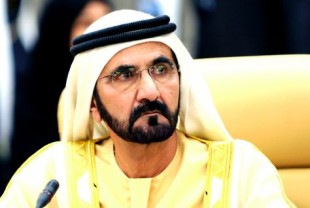

Dubai ruler pushes private sector to hire Emiratis

The UAE's private sector has "benefited greatly" from the country's rapid growth and as a result should do more to employ Emirati citizens, Sheikh Mohammed bin Rashid Al Maktoum, Prime Minister of the UAE and ruler of Dubai, said.
“I call on my colleagues in the private sector that have benefited greatly from this country to extend a helping hand in the process of Emiratisation, even in a tiny percentage, to make a contribution to growth of this country,” Sheikh Mohammed said in a question and answer session at a government conference in Dubai.
Speaking at the launch of the Government Summit, the first event of its kind in the Middle East, Sheikh Mohammed revealed plans for a project to employ 120,000 UAE nationals, but did not give any further details of the timeline or specifics.
The Dubai ruler, who is also vice president of the oil-rich UAE, last year declared 2013 the ‘Year of Emiratisation’. As part of the initiative, events will be held to offer “opportunities for young Emiratis seeking to join the UAE labour force”.
Emiratis only constitute about 11 percent of the UAE's population and are heavily outnumbered by foreign nationals. The majority of UAE nationals are employed by government entities, with the official unemployment rate among Emiratis put at 14 percent.
Emiratisation is the UAE government's policy of increasing the number of UAE nationals working in both the public and private sector.
In his speech, Sheikh Mohammed praised the work of Emiratis in the UAE government.
“Government employees are the engines of our achievements. They are the energy that fuels our development. I encourage them to keep on working with excellence and innovation. I am calling on all our employees to focus on acquiring knowledge and the right training needed to serve our country. Our employees need a competitive work environment where they should be supported, recognised and handed authority that allows them to perform better,” he said.
In an earlier discussion, Jennifer Blanke, Chief Economist and Head of The Global Competitiveness and Benchmarking Network at the World Economic Forum, said the UAE and governments in the region needed to do more to encourage locals to enter the private sector and develop a culture of entrepreneurship.
“It is still too attractive to work for the government,” Blanke said. “I am not saying you don’t want to have good people working in the government but it needs to be attractive to be able to set up your own business.
“This is not just a problem in the Middle East; it is a problem in many countries. Fostering a culture of entrepreneurship is very important.”